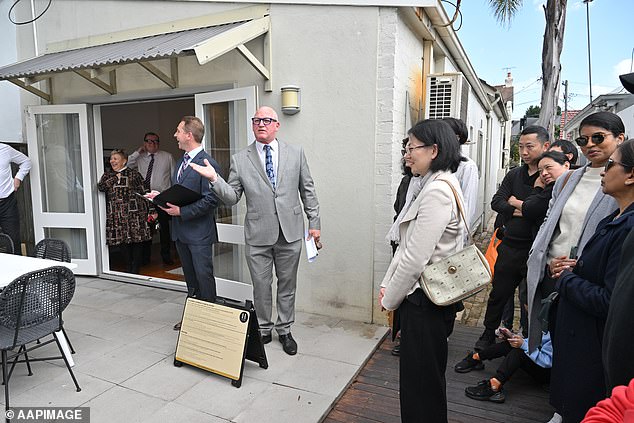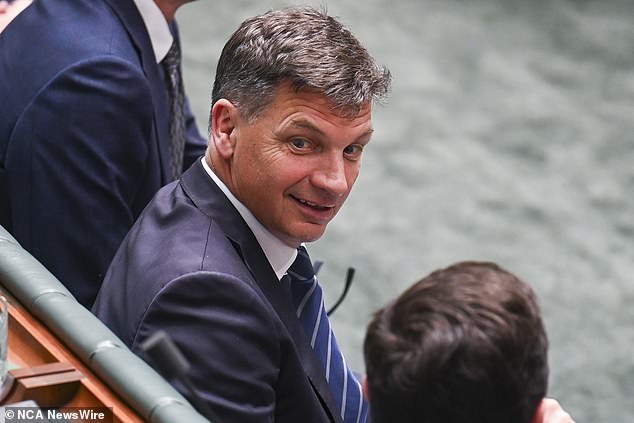How uproar over Albo’s Tourette’s remark allowed the PM to dodge a key question about a new tax that would hit millions of Aussies
Anthony Albanese’s criticism of people with Tourette’s syndrome overshadowed his failure to clearly rule out the introduction of a new tax on the family home.
The Prime Minister delivered a long-winded parliamentary rant on Tuesday afternoon after Shadow Treasurer Angus Taylor asked whether Labor had plans to tax owners’ properties.
‘Does the Prime Minister rule out any changes to the tax treatment of the private family home and to negative gearing?’ Mr. Taylor asked.
But Mr Albanese simply ridiculed the opposition with sarcasm rather than explicitly ruling out the introduction of a capital gains tax on the family home – which is exempt under existing laws.
‘I am actually being asked about a new element. Apparently we are now going after the parental home,’ the Prime Minister replied.
‘We’re going after the parental home!
‘They say we go in, there’s a knock on the door and we say, ‘We are the government. We’re here to take your house away from you. I am going to nationalize the house.”
Things really heated up when Mr Taylor asked him not to tax the family home on a point of order.
‘It was a very clear question. It wasn’t about the opposition. It was about the government’s proposal: their secret tax on the family home,” he said.
Speaker Milton Dick then instructed Mr Albanese to answer the question, but he had to use Tourette’s syndrome as a slur to insult Mr Taylor.
‘Do you have Tourette’s or something? You’re sitting there, “chat, chat, chat,” he said, before immediately apologizing and retracting the comment.
Anthony Albanese’s criticism of people with Tourette’s syndrome overshadowed his failure to completely rule out a new tax on the family home (he is pictured on Tuesday)
Amid the Question Time furor, Albanese accused the opposition of asking questions about policies that Labor had not announced. In doing so, he belatedly confirmed that the government had no plans to introduce a capital gains tax on the family home.
But it took the Prime Minister three minutes, from the moment Taylor asked his first question about the family home, for him to explain that it was not part of Labour’s plan.
“We have all our tax policies, and all the policies they want to talk about are things we don’t do,” he said.
Along the way, Mr Albanese had suggested the opposition was on a “fishing expedition” and sarcastically suggested Agriculture and Fisheries Minister Julie Collins answer the question about the family home.
The family home, or a person’s main residence, has been exempt from capital gains tax since its introduction in September 1985.
This meant that only investors paid the capital gains tax.
Labor lost the 2016 and 2019 elections by promising to remove negative gearing for future purchases of existing investment properties and limit it to new-build homes.

The family home, or a person’s principal residence, has been exempt from capital gains tax since its introduction in September 1985 (photo, an auction in Sydney)
In opposition, Labor had also campaigned to reduce the 50 percent capital gains tax credit introduced in September 1999.
A 25 percent reduction in capital gains taxes would have required investors to report 75 percent of capital growth on their tax returns instead of 50 percent.
But former Labor leader Bill Shorten had not proposed introducing a capital gains tax on the family home.
Existing laws ensure that an elderly couple who bought their family home in the late 1980s do not have to pay capital gains tax on sale.
But a younger investor who bought a house in Logan, south of Brisbane, would have to pay capital gains tax if he sold a property that had doubled in value in the past five years.

Mr Albanese delivered a long-winded parliamentary tirade after Shadow Treasurer Angus Taylor (pictured) asked him whether Labor had plans to tax owners’ properties.
Younger property buyers, locked out of the Sydney housing market, had been investing in more affordable markets such as Brisbane, Adelaide and Perth, where prices have risen by double digits over the past year despite the Reserve Bank’s 13 rate hikes in 2022 and 2023.
A Westpac-Melbourne Institute survey of 1,200 people in early October found that 70 to 75 percent of respondents expected house prices to rise in New South Wales, Queensland and Western Australia.
Treasurer Jim Chalmers confirmed last month that he had asked his department to model the economic effects of changing negative gearing rules so that a limit could hypothetically be applied to the number of properties on which an investor-landlord could get a tax break.
Investors can claim rental losses on their annual tax returns under negative gearing.
